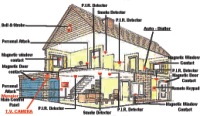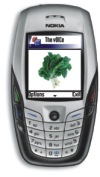|
Sci-tech
A
Dummy to Stop Snoring
Doctors in Germany claim to have developed a dummy, which
they say will prevent people from snoring. Researchers at
the University of Goettingen claim that the dummy, which
'parks' a person's tongue behind their teeth as they sleep,
working the same way as swallowing food, will allow the
user to keep their tongue in place thereby preventing them
from snoring. "We have successfully cured seven out
of 10 patients of snoring with this treatment," said
Goettingen University snoring expert, doctor Wilfried Engelke.
Engelke says that initially, although it may take a while
to get used to the device, with time the user gets used
to using it properly.
 Burglary
Prevention Burglary
Prevention
Are
you one of those people who always have a nagging feeling
that have forgotten to lock the door or switch the lights
off, after you have stepped out of the house? Well, now
you don't need to worry anymore as a new device will help
you perform all these functions from your car, while you
are driving. According to The Sun, the device, which was
presented at the 'Future Life House Project' recently, uses
a dashboard internet connection to link up with live web
cams in the house. With the help of the cameras you can
look at your entire house and lock your doors and windows
from a distance of more than a hundred miles. The device,
which is currently being tested in Switzerland, will also
help prevent burglary.
Wastewater
Treats Itself
If
a new study carried out by University of Toronto researchers
is to be believed, waste water contains enough organic matter
to produce at least 113 MW of electricity or about 990 KW
hours annually. "With a 20 percent recovery of that
potential energy into electricity, the wastewater treatment
plants could produce enough electricity for their own operation,"
claimed Professor David Bagley, a civil engineer. To determine
the amount of energy stored in wastewater's organic matter,
researchers used bomb calorimetry, a technique that measures
the heat content of materials. Power plants in the city
presently use aerobic treatment, a process by which microbes
decompose organic matter in the presence of oxygen. "We're
moving towards a future where we see our wastewaters and
other wastes as resources. If electricity costs go up, like
they have in places like California, this could be a cost-effective
and renewable energy source," Bagley concluded.
 Spinach
Powered Mobiles Spinach
Powered Mobiles
In
the next 10 years your cell phones and computers will probably
be green in colour, say scientists at the Massachusetts
Institute of Technology, who have found that Popeye's favourite
food, Spinach, is so rich a source of energy that it could
actually be used to power these gadgets. According to the
Boston Globe, the researchers say that in the future, cell
phones and computers would be covered in a spinach based
material and that they would get energy from sunlight, through
the process of photosynthesis. The gadgets will have an
attached electrical device that would enable them to recharge
themselves from sunlight. The researchers are now indicating
that since all the groundwork has been done, all they need
is a little bit of financial aid to actually turn their
findings into reality.
PC's
Turn 'Zombies'
US
Computer Security company 'Symantec' has revealed that an
average of 30,000 computers per day turned into enslaved
"zombies" in the first half of 2004. The company's
latest biannual report shows that recruitment of 'zombie'
machines peaked at 75,000 computers per day and also that
their advanced infection mechanisms make traditional antivirus
scanning techniques obsolete. According to the report, Zombies
have networks called 'Botnets' that are used to launch attacks
on corporate websites. Financial details of a company can
be harvested and the machine can be used to send spam. Information
was gathered from 180 countries and from anti-virus software
installed on desktop machines and corporate networks. The
increase of zombie machines reached an all-time high during
a turf war between two virus-writing groups, worms 'MyDoom'
and 'Bagle' and the Netsky virus for ownership of the infected
computers. In the meantime the owner of Netsky released
another version of his virus to deactivate both the worms.
"Virus writers can make good money by selling botnets
to online extortionists and spammers," The New Scientist
quoted Jeremy Ward a service development manager at Symantec,
as saying.
Source:
Webindia123.com / The New Scientist.com / Google
Copyright
(R) thedailystar.net 2004
|
